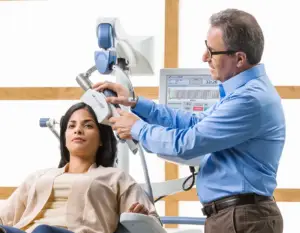FDA-Approved TMS Therapy in Houston for Lasting Depression Relief
Getting a workable form of treatment for depression can be an uphill battle. Depressed individuals many times find themselves in a rut when the common methods of antidepressants or psychotherapy fail to alleviate the numbness and emptiness of depression. But there’s a modern alternative that’s offering new hope to many withTMS therapy in Houston.
It is a non-invasive therapy (Transcranial Magnetic Stimulation or TMS) that is becoming a game changing approach to depression. TMS, with clinical support and FDA approval, is assisting patients toward long-term improvement
What Is FDA-Approved TMS Treatment?
FDA-approved TMS treatment is a therapy that involves magnetic pulses targeted towards a particular part of the brain that deals with mood and emotional regulation and balance. These regions tend to exhibit reduced functions in individuals with major depressive disorder. When activated in a gentle manner, TMS assists in repairing healthy functioning of the brain with time.
TMS is done when the patient is awake and alert unlike more invasive procedures or drugs that have complicated side effects. TMS treatment sessions take approximately 20 minutes and people can resume their normal lives after a session.
How TMS Works for Depression

Understanding how TMS works for depression requires a look at the brain’s communication system. In individuals with depression, certain neural networks — especially those involving the prefrontal cortex — tend to underperform. TMS delivers focused magnetic stimulation to these areas, encouraging improved connectivity and activity.
This process doesn’t rely on chemical intervention, which makes it a promising option for those who haven’t responded well to medications or who are seeking alternative solutions. Over a series of sessions, many patients begin to experience clearer thinking, better mood regulation, and greater emotional resilience.
A Safe Depression Treatment in Houston
The demand for a safe depression treatment in Houston has grown significantly in recent years — especially as awareness increases around mental health care. TMS stands out because it avoids many of the challenges associated with pharmacological treatments.
Patients report very few side effects, and when they do occur, they’re typically mild — such as scalp discomfort or slight headache during the first few sessions. There is no sedation, memory loss, or systemic impact, which makes it a well-tolerated option for a broad range of individuals.
At trusted Houston clinics like Texas TMS Center, care is personalized and guided by board-certified professionals. Treatment plans are tailored to each individual’s history and progress, ensuring safety and effectiveness at every step.
Non-Medication Therapy for Depression That Works
The need for non-medication therapy for depression has never been more urgent. While antidepressants work well for some, others experience little to no relief, or cannot tolerate the side effects. TMS fills that gap by offering a science-backed, drug-free option.
It’s not about replacing one treatment with another — it’s about giving patients more choices. For many, TMS complements therapy, antidepressants or other wellness strategies, forming part of a more holistic care plan. Others may find it offers the results they’ve been looking for on its own.
This flexibility is one of TMS’s strongest advantages. It can fit into different treatment journeys without forcing patients into a one-size-fits-all solution.
Why Houston Is Leading the Way in TMS Therapy
Houston has become a growing hub for innovative mental health care, and access to TMS therapy in Houston is expanding accordingly. Clinics across the city are now offering this treatment, giving residents greater opportunity to explore alternatives to conventional care.
At Texas TMS Center, patients benefit from both convenience and clinical excellence. With a patient-first philosophy, modern equipment, and a dedicated mental health team, the center has become a preferred destination for those seeking meaningful, long-term relief.
A Modern Path Toward Recovery
Depression is complex, and no two experiences are the same. That’s why having options like TMS — especially options that are effective, FDA-approved, and non-invasive — is so important.
If you’re in Houston and struggling to find lasting relief, TMS therapy might be the step forward you’ve been looking for. With minimal disruption to your daily life, and a growing body of success stories, TMS continues to reshape how we treat depression.
Frequently Asked Questions (FAQs)
What makes TMS therapy in Houston a good option for depression?
TMS therapy in Houston is widely trusted because it’s FDA-approved, non-invasive, and available through experienced local providers like Texas TMS Center. It offers a promising solution for people who at first found relief through antidepressants, but overtime found antidepressant wearing off over time.
Is FDA-approved TMS treatment safe for long-term use?
Yes, FDA-approved TMS treatment has been shown to be both safe and effective in clinical trials and real-world practice. It does not involve sedation or systemic medication, and most patients experience minimal, temporary side effects like mild scalp discomfort.
How does TMS work for depression, and how soon will I see results?
When understanding how TMS works for depression, think of it as activating underperforming areas of the brain related to mood. Most patients begin to notice improvement after 2–3 weeks, with full benefits typically seen by the end of the 7 week treatment course.
Can I receive a safe depression treatment in Houston without taking medication?
Absolutely. TMS is considered a safe depression treatment in Houston that doesn’t rely on drugs. It’s a non-medication option that works by gently stimulating targeted brain regions, making it ideal for individuals who are medication-resistant or want to avoid drug-related side effects.
Is TMS a reliable non-medication therapy for depression?
Yes, non-medication therapy for depression like TMS is backed by strong research and has helped thousands of patients achieve long-term relief. It offers a science-based approach without the chemical effects of antidepressants, which is appealing to many looking for alternatives.



